| Listing 1 - 10 of 38 | << page >> |
Sort by
|
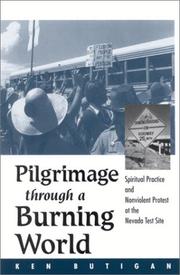
ISBN: 0791486508 1417506695 9781417506699 079145777X 9780791457771 0791457788 9780791457788 9780791486504 Year: 2003 Publisher: Albany State University of New York Press
Abstract | Keywords | Export | Availability | Bookmark
 Loading...
Loading...Choose an application
- Reference Manager
- EndNote
- RefWorks (Direct export to RefWorks)
For two decades the Nevada Desert Experience has organized nonviolent action at the Nevada Test Site as part of the global movement to end nuclear testing. Pilgrimage through a Burning World illuminates how the Franciscan-based group has crafted a contemporary desert spirituality that integrates religious ritual and political action to grapple with the challenges of an institutionalized and internalized nuclear world. Ken Butigan shows how the annual pilgrimage to the test site has contributed to the personal transformation of people "on both sides of the fence" at the test site and to the worldwide emergence of the Comprehensive Test Ban Treaty.
Antinuclear movement --- Nuclear warfare --- Anti-nuclear movement --- Antinuclear protest movement --- Nuclear freeze movement --- Protest movement, Antinuclear --- Social movements --- Nuclear disarmament --- Nuclear power plants --- Religious aspects --- Christianity.
Book
ISBN: 1108679161 1108627420 1316479749 1107136288 1316501787 Year: 2017 Publisher: New York : Cambridge University Press,
Abstract | Keywords | Export | Availability | Bookmark
 Loading...
Loading...Choose an application
- Reference Manager
- EndNote
- RefWorks (Direct export to RefWorks)
This book brings together cutting-edge scholarship from the United States and Europe to address political as well as cultural responses to both the arms race of the 1980s and the ascent of nuclear energy as a second, controversial dimension of the nuclear age. Diverse in its topics and disciplinary approaches, Nuclear Threats, Nuclear Fear and the Cold War of the 1980s makes a fundamental contribution to the emerging historiography of the 1980s as a whole. As of now, the era's nuclear tensions have been addressed by scholars mostly from the standpoint of security studies, focused on the geo-strategic deliberations of political elites and at the level of state policy. Yet nuclear anxieties, as the essays in this volume document, were so pervasive that they profoundly shaped the era's culture, its habits of mind, and its politics, far beyond the domain of policy.
Antinuclear movement --- World politics --- Cold War --- Anti-nuclear movement --- Antinuclear protest movement --- Nuclear freeze movement --- Protest movement, Antinuclear --- Social movements --- Nuclear disarmament --- Nuclear power plants --- History
Book
ISBN: 0804771243 9780804771245 9780804756310 0804756317 9780804756327 0804756325 Year: 2009 Publisher: Stanford, Calif.
Abstract | Keywords | Export | Availability | Bookmark
 Loading...
Loading...Choose an application
- Reference Manager
- EndNote
- RefWorks (Direct export to RefWorks)
Confronting the Bomb tells the dramatic, inspiring story of how citizen activism helped curb the nuclear arms race and prevent nuclear war. This abbreviated version of Lawrence Wittner's award-winning trilogy, The Struggle Against the Bomb, shows how a worldwide, grassroots campaign—the largest social movement of modern times—challenged the nuclear priorities of the great powers and, ultimately, thwarted their nuclear ambitions. Based on massive research in the files of peace and disarmament organizations and in formerly top secret government records, extensive interviews with antinuclear activists and government officials, and memoirs and other published materials, Confronting the Bomb opens a unique window on one of the most important issues of the modern era: survival in the nuclear age. It covers the entire period of significant opposition to the bomb, from the final stages of the Second World War up to the present. Along the way, it provides fascinating glimpses of the interaction of key nuclear disarmament activists and policymakers, including Albert Einstein, Harry Truman, Albert Schweitzer, Norman Cousins, Nikita Khrushchev, Bertrand Russell, Andrei Sakharov, Linus Pauling, Dwight Eisenhower, Harold Macmillan, John F. Kennedy, Randy Forsberg, Mikhail Gorbachev, Helen Caldicott, E.P. Thompson, and Ronald Reagan. Overall, however, it is a story of popular mobilization and its effectiveness.
Antinuclear movement --- Nuclear disarmament --- Anti-nuclear movement --- Antinuclear protest movement --- Nuclear freeze movement --- Protest movement, Antinuclear --- Social movements --- Nuclear power plants --- History. --- Mouvement antinucléaire --- Désarmement nucléaire --- Histoire
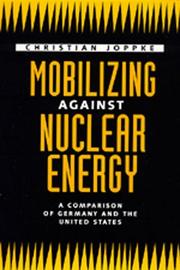
ISBN: 0520912527 0585043752 9780520912526 9780585043753 0520078136 Year: 1993 Publisher: Berkeley University of California Press
Abstract | Keywords | Export | Availability | Bookmark
 Loading...
Loading...Choose an application
- Reference Manager
- EndNote
- RefWorks (Direct export to RefWorks)
In the past two decades young people, environmentalists, church activists, leftists, and others have mobilized against nuclear energy. Anti-nuclear protest has been especially widespread and vocal in Western Europe and the United States. In this lucid, richly documented book, Christian Joppke compares the rise and fall of these protest movements in Germany and the United States, illuminating the relationship between national political structures and collective action. He analyzes existing approaches to the study of social movements and suggests an insightful new paradigm for research in this area. Joppke proposes a political process perspective that focuses on the interrelationship between the state and social movements, a model that takes into account a variety of forces, including differential state structures, political cultures, movement organizations, and temporal and contextual factors. This is an invaluable work for anyone studying the dynamics of social movements around the world.
Antinuclear movement --- Social movements --- Business & Economics --- Industries --- Movements, Social --- Social history --- Social psychology --- Anti-nuclear movement --- Antinuclear protest movement --- Nuclear freeze movement --- Protest movement, Antinuclear --- Nuclear disarmament --- Nuclear power plants --- Political aspects. --- Political aspects
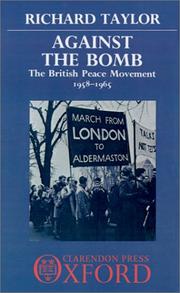
ISBN: 0198275374 9780198275374 Year: 1988 Publisher: Oxford Clarendon Press
Abstract | Keywords | Export | Availability | Bookmark
 Loading...
Loading...Choose an application
- Reference Manager
- EndNote
- RefWorks (Direct export to RefWorks)
Antinuclear movement --- Nuclear disarmament --- History. --- -Atomic bomb and disarmament --- Atomic weapons and disarmament --- Disarmament, Nuclear --- Nuclear weapons disarmament --- Disarmament --- Nuclear weapons --- Anti-nuclear movement --- Antinuclear protest movement --- Nuclear freeze movement --- Protest movement, Antinuclear --- Social movements --- Nuclear power plants --- History --- -History. --- Atomic bomb and disarmament --- Great Britain --- Antinuclear movement - Great Britain - History. --- Nuclear disarmament - Great Britain - History.
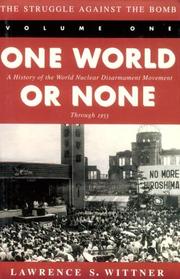
ISBN: 0804725284 0804721416 0804731691 Year: 1997 Volume: 1 Publisher: Stanford Stanford University Press
Abstract | Keywords | Export | Availability | Bookmark
 Loading...
Loading...Choose an application
- Reference Manager
- EndNote
- RefWorks (Direct export to RefWorks)
861 Vredesbeweging --- 872 Massavernietigingswapens --- Antinuclear movement --- Nuclear disarmament --- History. --- Mouvement antinucléaire --- Désarmement nucléaire --- History --- Histoire --- World history --- Polemology --- anno 1970-1979 --- anno 1960-1969 --- anno 1950-1959 --- Anti-nuclear movement --- Antinuclear protest movement --- Nuclear freeze movement --- Protest movement, Antinuclear --- Social movements --- Nuclear power plants
Book
ISBN: 0942024001 Year: 1981 Publisher: Kentucky Vision Books
Abstract | Keywords | Export | Availability | Bookmark
 Loading...
Loading...Choose an application
- Reference Manager
- EndNote
- RefWorks (Direct export to RefWorks)
858.1 Politiek geweld --- 861 Vredesbeweging --- 872 Massavernietigingswapens --- Antinuclear movement --- Disarmament --- Nuclear warfare --- Limitation of armament --- Military power --- Anti-nuclear movement --- Antinuclear protest movement --- Nuclear freeze movement --- Protest movement, Antinuclear --- Moral and ethical aspects --- Armed Forces --- Arms control --- Arms race --- Military readiness --- Military weapons --- Peace --- Security, International --- Social movements --- Nuclear disarmament --- Nuclear power plants
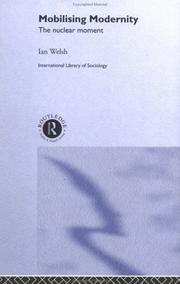
ISBN: 0415047919 0415755506 1280031409 0203167902 0203283562 9786610031405 9780203167908 6610031401 9780415047913 9781134945764 9781134945801 9781134945818 9780415755504 1134945809 Year: 2003 Publisher: London Routledge
Abstract | Keywords | Export | Availability | Bookmark
 Loading...
Loading...Choose an application
- Reference Manager
- EndNote
- RefWorks (Direct export to RefWorks)
During the nuclear heyday of the post-war years advocates of atomic power promised cheap electricity and a prosperous future. From the present, however, this promise seems tarnished by accidents, leaks and a lack of public confidence. Mobilising Modernity traces this journey from confidence in technology to the anxieties of the Risk Society questioning a number of conventional wisdoms en route. Paying close attention to social, political and policy aspects throughout, this book considers:* the nuclear moment from global collaborative project at Los Alamos to fragmented, bitter
Nuclear industry. --- Nuclear energy --- Antinuclear movement. --- Social aspects. --- Anti-nuclear movement --- Antinuclear protest movement --- Nuclear freeze movement --- Protest movement, Antinuclear --- Atomic energy industries --- Atomic industry --- Atomic power industry --- Nuclear energy industry --- Nuclear power industry --- Social movements --- Nuclear disarmament --- Nuclear power plants --- Energy industries
Book
ISBN: 0801499380 9781501719998 1501719998 0801426359 9780801426353 9780801499388 1501720007 1501727974 Year: 1992
Abstract | Keywords | Export | Availability | Bookmark
 Loading...
Loading...Choose an application
- Reference Manager
- EndNote
- RefWorks (Direct export to RefWorks)
When thousands of women gathered in 1983 to protest the stockpiling of nuclear weapons at a rural upstate New York military depot, the area was shaken by their actions. What so disturbed residents that they organized counterdemonstrations, wrote hundreds of letters to local newspapers, verbally and physically harassed the protestors, and nearly rioted to stop one of the protest marches? Louise Krasniewicz reconstructs the drama surrounding the Women's Encampment for a Future of Peace and Justice in Seneca County, New York, analyzing it as a clash both between and within communities. She shows how debates about gender and authority-including questions of morality, patriotism, women's roles, and sexuality-came to overshadow arguments about the risks of living in a nuclear world. Vivid ethnography and vibrant social history, this work will engage readers interested in American culture, women's studies, peace studies, and cultural anthropology.
812 Ideologie --- 848 Demografie --- 858.1 Politiek geweld --- 861 Vredesbeweging --- 863 Pacifisme --- 873 Wapenbeheersing --- 882.4 Noord-Amerika --- Antinuclear movement --- Women and peace --- Social aspects --- Seneca Army Depot. --- Peace and women --- Peace --- Women pacifists --- Anti-nuclear movement --- Antinuclear protest movement --- Nuclear freeze movement --- Protest movement, Antinuclear --- Social movements --- Nuclear disarmament --- Nuclear power plants --- Romulus, N.Y. --- History of the Americas
Book
ISBN: 0262140349 Year: 1981 Publisher: Cambridge (Mass.): MIT press
Abstract | Keywords | Export | Availability | Bookmark
 Loading...
Loading...Choose an application
- Reference Manager
- EndNote
- RefWorks (Direct export to RefWorks)
Nuclear energy --- Government policy --- Citizen participation. --- Antinuclear movement --- 621.039 --- Atomic energy --- Atomic power --- Energy, Atomic --- Energy, Nuclear --- Nuclear power --- Power, Atomic --- Power, Nuclear --- Anti-nuclear movement --- Antinuclear protest movement --- Nuclear freeze movement --- Protest movement, Antinuclear --- Government policy&delete& --- Citizen participation --- Force and energy --- Nuclear physics --- Power resources --- Nuclear engineering --- Nuclear facilities --- Nuclear power plants --- Social movements --- Nuclear disarmament
| Listing 1 - 10 of 38 | << page >> |
Sort by
|

 Search
Search Feedback
Feedback About UniCat
About UniCat  Help
Help News
News